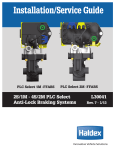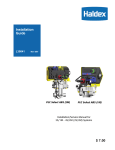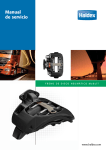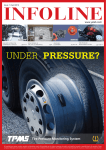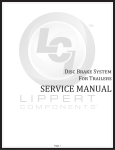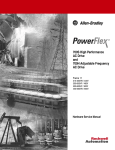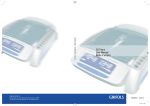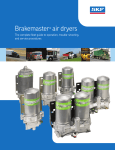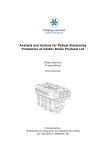Download ModulAir® Installation/Service Manual
Transcript
Installation Guide L31241 10/08 Haldex ModulAir® Installation / Service Manual Technical Service and Engineering Support In the U.S. please call: 1-800-643-2374 (press 2) In Canada, please call: 1-800-267-9247 www.haldex.com www.hbsna.com IMPORTANT NOTICE The data listed herein is correct to the best of Haldex’s knowledge and belief, having been compiled from reliable and official sources of information. However, HALDEX CAN NOT ASSUME ANY RESPONSIBILITY for possible error or misapplication of the product. Final determination of the suitability of the products for the use contemplated by the Buyer is the sole responsibility of the Buyer. Haldex shall have no responsibility in connection with this suitability. IMPORTANT NOTICE The description and specifications contained in this Installation Manual are current at the time of printing. Haldex Brake Products Corp. reserves the right to discontinue or modify its models and/or procedure and to change specifications at any time without notice. Page 1 Table of Contents Section Page ModulAir® Dryer Purpose, Anatomy and Function Product Purpose . . . . . . . . . . . . . . . . . . . . . . . . . . . . . . . . . . . . . . . . . . . . . . . . . . . . . . . . . . .3 Product Anatomy . . . . . . . . . . . . . . . . . . . . . . . . . . . . . . . . . . . . . . . . . . . . . . . . . . . . . . . . . . .4 Product Function . . . . . . . . . . . . . . . . . . . . . . . . . . . . . . . . . . . . . . . . . . . . . . . . . . . . . . . . . . .6 Technical Data . . . . . . . . . . . . . . . . . . . . . . . . . . . . . . . . . . . . . . . . . . . . . . . . . . . . . . . . . . . . .9 ModulAir® Dryer Installation Guidelines . . . . . . . . . . . . . . . . . . . . . . . . . . . . . . . . . . . . . . . . . . .12 ModulAir® Dryer Troubleshooting Guide . . . . . . . . . . . . . . . . . . . . . . . . . . . . . . . . . . . . . . . . . .18 ModulAir® Dryer Service Parts Kit Information . . . . . . . . . . . . . . . . . . . . . . . . . . . . . . . . . . . . .19 Page 2 ModulAir® Dryer Product Purpose In its most basic form, ModulAir® is an air dryer intended to remove water and other contaminants from a commercial vehicle’s air brake system. The ModulAir® air dryer is a desiccant style dryer that removes moisture from compressed air delivered to a vehicle’s braking system by an air compressor. Additionally, ModulAir® contains a number of other additional valves that further help dry, clean, distribute and control air to an air braked vehicle, including the braking, suspension and auxiliary systems. Page 3 ModulAir® Dryer Product Anatomy The ModulAir® dryer consists of three main modules; the Dryer Module, for drying; the Distribution Module to deliver air to brake circuits; and the Control Module to control air production and dryer purge operation Dryer Module The Dryer Module holds the turbo protection valve, check valve, safety valve, desiccant cartridge with canister and heater assembly. Distribution Module The Distribution Module for the ModulAir® 4-Circuit version contains four pressure protection valves that are set at different pressure settings to give a priority to the primary, secondary and remaining two circuits. Although the dryer purges contaminants through a hole in the Distribution Module it does not contain valves or components that control the dryer purge cycle. Control Module The Control Module on the standard version of ModulAir® consists of a typical piston air governor that is pre-set to cut-in and cut-out pressures. Other versions of the ModulAir® Control Module include various electronic controls for governor, circuit pressure monitoring and control, and air dryer purge cycle. Desiccant Cartridge, Canister and Mounting Collar Turbo Protection Valve Unloader or Purge Valve Dryer Module Governor Control Module Distribution Module Safety Valve Heater Regeneration Valve Figure 1: ModulAir® Exploded View Page 4 Desiccant Cartridge, Canister and Mounting Collar The desiccant cartridge is where all drying and contaminant removal occur in the air dryer. The Haldex ModulAir® dryer contains the Haldex patented MTC cartridge design which has five separate stages of drying. The desiccant cartridge is covered by the canister and affixed to the dryer base with the mounting collar and four bolts. Turbo Protection Valve The turbo protection valve, located at the dryer inlet, prevents turbo pressure loss on turbocharged compressor applications when compressor in unloaded. Governor A standard pneumatic piston-style governor is used in ModulAir® to control the cut in and cut out pressures in the air system. The governor signals the compressor to load or unload. Safety Valve The safety, or pop off valve, is designed to relieve system pressure if it reaches a level higher than normal operating pressures. This protects other brake system components from high pressures that could cause system damage or failure. Unloader/Purge Valve The unloader/purge valve in ModulAir® is essentially a purge valve. When the dryer is ready to purge, the unloader/purge valve opens to allow all contaminants collected within the dryer and cartridge to be flushed out through the purge port on the dryer. Regeneration Valve The regeneration valve serves as a timer to allow a designated amount of air to flow from the air brake system back through the ModulAir® dryer in order for it to purge and regenerate the desiccant. Heater A heater helps prevent moisture collected within the air dryer from freezing. The integrated thermostat on the heater controls when the heater is energized. Page 5 ModulAir® Dryer Product Function In an unpressurized state, all valves internal to the ModulAir® assembly should be in the closed position as shown in Figure 2. This includes the turbo protection valve (T), safety valve (S), unloader valve (U), check valve (C), regeneration valve (R) and all pressure protection valves (O1...O4). Diagram Key: C ... D ... G ... O1 . . . Check valve Air dryer cartridge Governor Pressure protection valve circuit 21 O2 . . . Pressure protection valve circuit 22 O3 . . . Pressure protection valve circuit 23 O4 . . . Pressure protection valve circuit 24 R . . . Regeneration valve S . . . Safety valve T . . . Turbo protection valve U . . . Unloader valve 11 . . . Incoming air from compressor 21 . . . Primary circuit 22 . . . Secondary circuit 23 . . . Auxiliary 1 24 . . . Auxiliary 2 3 . . . Exhaust 4 . . . Control Figure 2: ModulAir® dryer and air system with no pressure in the dryer or the air brake circuits Page 6 Start of Air System Fill When the engine is first started, compressed air from the air compressor flows through the discharge line to the inlet port marked 11 on ModulAir®. When the inlet pressure gets to about 44 psi, the turbo protection valve (T) opens and allows air to flow through the desiccant cartridge (D) and the check valve (C) opens as seen in Figure 3. Filling of Primary, Secondary, and Auxiliary Circuits As the pressure within the ModulAir® dryer continues to build, the pressure protection valves that control air to the primary, secondary and auxiliary circuits begin to open in sequence according to their factory preset opening pressures (see Technical Data section page 9). Each pressure protection valve is set at different opening pressure to give filling preference to one or more circuits versus others. Typically, the primary circuit is filled first, so its pressure protection valve would be set to open before all others. Figure 3: Turbo protection valve (T) and check valve (C) open Figure 4: All pressure protection valves (O1…04) open and filling primary brake circuits Page 7 Compressor Cut-out and ModulAir® Dryer Regeneration When the system pressure has reached the set cut-out pressure, the governor (G) sends a control signal through port 4 to the compressor so that it will unload. At the same time, the unloader valve (U) receives this control line pressure, causing it to open and allow air to backflow from the air brake circuits (figure 5). The regeneration valve (R) serves as a timer that will allow sufficient air to backflow from the brake circuits before closing as seen in figure 6. Figure 5: Unloader valve (U) open and regeneration valve (R) allowing air to backflow through dryer for purge cycle Page 8 Figure 6: All pressure protection valves (O1…04) open and filling primary brake circuits Technical Data for ModulAir® Dryer Air Flow Maximum inlet airflow Typical inlet airlflow = = 35 scfm (991 slpm) 12 scfm @ 125 psi, 160º F (340 slpm @ 8.6 bar, 71ºC) Temperature Maximum operating range Recommended operating range = = -40°F to +175°F (-40°C to +80°C) +40°F to +150°F (+5°C to +65°C) Pressure Governor settings Cut-in pressure Pressure range = = 105 ± 5 psi (7.25 ± 0.35 bar) 22.5 ± 7.5 psi (1.55 ± 0.5 bar) Safety valve opening pressure Burst pressure = = 175 + 14 psi (12 + 1 bar) 360 psi (25 bar) Turbo protection valve Opening pressure Closing pressure = = 44 ± 8 psi 22 ± 3 psi Pressure protection valves Opening pressure primary circuit (21) Closing pressure primary circuit (21) = = 103 ± 3 psi (7.1 ± 0.2 bar) 82 psi (5.7 bar) Opening pressure secondary circuit (22) = Closing pressure secondary circuit (22) = 109 ± 3 psi (7.5 ± 0.2 bar) 87 psi (6.0 bar) Opening pressure auxiliary circuit 1 (23) = Closing pressure auxiliary circuit 1 (23) = 55 ± 3 psi 42 psi (3.8 ± 0.2 bar) (2.9 bar) Opening pressure auxiliary circuit 2 (24) = Closing pressure auxiliary circuit 2 (24) = 84 ± 3 psi 66 psi (5.8 ± 0.2 bar) (4.6 bar) (3 ± 0,5 bar) (1.5 ± 0.2 bar) Maximum Inlet Airflow = about 35 SCFM ( about 990 SLPM) Electrical Nominal voltage Power consumption Resistance Amperage = = = 12 or 24 V DC 90 Watt 8 amps @ 12V / 4 amps @ 24V Weights Assembly weight Desiccant cartridge weight = = about 20.0 lbs (about 9.1 Kg) about 3.5 lbs (about 1.6 Kg) Torque Values Cannister bolts Governor bolts Heater screw = = = 32 - 35 lbf - ft (43 - 47 Nm) 110 - 150 lbf - in (11.5 - 13.8 Nm) 45 - 55 lbf - in (5.1 - 6.2 Nm) Loctite Note: Loctite blue should be used very sparingly and Loctite red should never be used. Page 9 Page 10 Dimensions Page 11 ModulAir® Dryer Installation Guidelines Haldex recommends that all installations follow SAE standard J2383 and much of the following information is extracted from SAE J2383, with certain unique requirements specific to the ModulAir® dryer family. Mounting Position • The air dryer should be mounted in a location with sufficient space around it to facilitate service and to provide visual access for periodic inspection. • The air dryer should be mounted in an area where it is protected from tire or wheel road splash. • The air dryer, including mounting brackets, lines and fittings should be mounted in a protected location such that minor mechanical damage to the vehicle will not damage the air system integrity. • The air dryer must be mounted with the exhaust port pointed downward. • The air dryer must be mounted to avoid excessive heat sources (175º F max). • The air dryer mounting method must be rigid enough to avoid vibration which could damage the desiccant or dryer. • The air dryer must not incline in any direction more than 15° from vertical position. • The air dryer must have at least 0.5 in (12.5 mm) free space above the cartridge canister to allow for removal during service. Mounting Method • The ModulAir® dryer uses the standard 3-bolt pattern shown in the figure below. A c B Page 12 A= 2.83 in (72mm) B = 4.13 in (105mm) C = 2.07 in (52.5 mm) Drill Clearance Hole Diameter for 1/2”—UNC 28 Bolt Air Lines and Fittings Air Lines • To prevent moisture accumulation, the compressor discharge line should slope continuously downhill from the compressor to the dryer without any dips which exceed ½ the line diameter. If this is not possible, the line should run vertically straight upward at the compressor to a height that will permit a downhill sloping run to the dryer. • The compressor discharge line size, length, and material must be such that the inlet temperature is typically no more than 160°F (71°C), and no less than 77°F (25°C) above the lowest ambient temperature. Lower dryer inlet temperatures should be avoided to minimize the risk of freeze-ups in the discharge line or dryer inlet fitting. Higher dryer inlet temperatures should be avoided to minimize the risk of heat damage to the dryer seals and/or to avoid loss of drying performance. Fittings • The use of restrictive fittings in the compressor discharge line should be avoided. These restrictive fittings impede the airflow and contribute to increased freezing potential. Avoid the use of 90° elbows where possible • The air dryer must not incline in any direction more than 15° from vertical position. • The air dryer must have at least 0.5 in (12.5 mm) free space above the cartridge canister to allow for removal during service. • Use Teflon tape on fittings very sparingly, keeping in mind that it could break loose and contaminate the air valve seals. Page 13 ModulAir® Dryer Installation Guidelines Important Precautions and Preparations • All company and vehicle manufacturer’s safety procedures must be followed when installing the ModulAir® dryer. • Always wear proper personal protective equipment, including approved eye glasses. • Never work on or under a vehicle unless it is parked on a level surface and its wheels are blocked to prevent it from moving. • Never work on a vehicle air brake system when the engine is running. Where circumstances require that the engine be in operation, extreme caution should be used to prevent personal injury resulting from contact with moving, rotating, leaking, heated or electrically charged components. • Drain all air pressure from the air system before beginning any installation, service, or repair. • Never connect or disconnect a hose or line containing pressure. Never remove a component plug unless it is certain that all system pressure has been depleted. • Never exceed recommended component or system pressures. • Do not attempt to install, remove, disassemble or assemble a component until all recommended procedures have been read and are fully understood. Use only the proper tools and observe all precautions pertaining to the use of those tools. • Use only genuine Haldex replacement parts, components and kits. Replacement hardware, tubing, fitting, etc should be of equivalent size, type and strength as original equipment and be designed specifically for such applications and systems. • Components with stripped threads or damaged part should be replaced rather than repaired. Repairs requiring machining or welding should not be attempted unless specifically approved and stated by the vehicle or component manufacturer. • Prior to returning the vehicle to service, make certain all components and systems are restored to their proper operating condition. Page 14 Mounting Guidelines 1. Locate ModulAir® dryer in an area with sufficient space that will allow for service and visual access for inspection. 2. Dryer should be mounted away from direct tire splash. 3. The dryer exhaust, or purge port must point downward. Reference page 10. 4. Mounting location must be selected to avoid excessive heat. 5. Mounting location must be rigid and not susceptible to excess vibration. 6. Compressor discharge line must slope downward, without dips and 90° fittings should be avoided. 7. Mounted dryer should not have more than 15° inclination from vertical. 8. Ensure that there is a minimum of ½” above dryer for serviceability of the desiccant cartridge. 9. The ModulAir® dryer has a standard SAEJ2383 3-bolt mounting pattern and can be used to mount directly to a frame member. However, a mounting bracket can be used if necessary. Basic Installation Steps Mounting 1. Park the vehicle on a level surface, apply the parking brakes and always block the wheels. 2. Stop the engine. 3. Drain the air pressure from all reservoirs before beginning any work on the vehicle. 4. Following the vehicle manufacturer’s recommended procedures, deactivate the electrical system in a manner that removes all electrical power from the vehicle. 5. Locate the dryer to the intended mounting position in accordance with the above mounting guidelines and install ½” - 28 minimum grade 5 bolt with lock washer, tightening to 45-55 ft-lb of torque. Electrical 6. For those dryers with a heater, it must be connected to the vehicle power supply. Locate a circuit with the correct voltage that is energized, or “hot,” when the ignition is “ON.” The current draw is 8 amps at 12 V and 4 amps at 24 V. A 10-15 amp fuse is recommended in this line. Connect the one heater lead to this “hot” wire. 7. Connect the other heater lead to a good electrical ground on the vehicle chassis or within an electrical junction box. Care should be taken to protect the grounding connection from the water and other contaminant ingression. Page 15 Connecting Air Lines 8. Connect a suitable compressor discharge line to the ½” NPT dryer inlet port marked 11, making sure that the line slopes down from the compressor to the air dryer. The compressor discharge line material should be wire braided “Teflon” hose, copper tubing or a combination of both. The length of compressor discharge line should be selected so that the dryer inlet does not exceed 170°F (77°C). This can generally be accomplished with 12 to 15 feet of air compressor discharge length. Excessive discharge length should also be avoided to prevent moisture from freezing. The dryer inlet must be greater than 40°F (5°C). 9. From both the primary and secondary reservoirs connect suitable ½” NPT line to the air dryer ports for the primary (21) and secondary (22) circuits. 10. Connect a ¼” NPT fitting with nylon line or equivalent to the control port (4) of the dryer. The other end of the control line will typically be connected back to the compressor. 11. Connect ¼” NPT line to those auxiliary circuits desired. Any additional ports not used can be plugged with the appropriate ¼” NPT pipe plug. Teflon tape or other approved sealant should be used sparingly on the pipe plug to prevent leakage. Installation Tip: While minimum diameters are specified, larger line diameters generally improve performance, service life, and reduce operating temperatures, particularly in severe applications. Do not attempt to adjust or service the pressure protection valve, as this could cause system pressure loss and automatic parking brake application. Pressure protection valve springs are under load and could cause serious personal injury if distribution housing is removed. Page 16 Testing the ModulAir® Dryer Before placing the vehicle into service, perform the following tests: 1. Close all reservoir drain valves and ensure all lines are connected properly. 2. Assure transmission is in neutral, start engine. Build up system air pressure to governor cut-out and note that the air dryer purges with an audible exhaust of air. Air should continue to flow from the dryer exhaust as the dryer purges and regenerates the desiccant for approximately 20 - 30 seconds. Testing Tip: The pressure gauges for the primary, secondary and auxiliary circuits will begin to fill at different pressures. Typically, the primary will fill first, with the secondary and auxiliaries to follow shortly after. 3. Actuate the service brakes a number of times to reduce system air pressure to governor cut-in. Ensure that the system once again builds to full required system pressure and that the dryer purges when the compressor cuts out (compressor unloads). 4. It is recommended that the vehicle be tested for leakage using the following procedure to assure that the air dryer will not cycle excessively: A. Apply the parking brakes, run engine to build system pressure to governor cut-out and allow pressure to stabilize for at least 1 minute at idle. B. Observe the dash gauge pressures for 2 minutes and note any pressure drop. Pressure drop should not exceed 4 psi with brake pedal released and 6 psi with brakes applied. Any noticeable leakage must be repaired to avoid excessive cycling. C. On vehicles using “system regeneration,” which is how the ModulAir® dryer functions, the vehicle air gauges will drop slightly as the dryer purges. 5. Charge cycle time: during normal, daily operation, the compressor should recover from governor cut-in to governor cut-out in 90 seconds or less depending upon the engine RPM and vehicle vocation. 6. Purge cycle interval: During normal vehicle operation, the air compressor must remain unloaded for a minimum of 30 seconds between charge cycles. This minimum purge time is required to ensure complete regeneration of the desiccant. Page 17 ModulAir® Dryer Troubleshooting Guide Problem Cause Solution Water in air system 1. Desiccant contaminated (oil) or over saturated. 1. Replace desiccant cartridge. Wipe dryer base clean Check compressor for excessive oil passage. 2. Leaks in air system. 2. Tighten air connections. Use soapy water to recheck for leaks following the Testing the ModulAir® Dryer section. 3. Governor loose or not functioning properly. 3. Check governor gasket for damage and replace if necessary. Reassemble governor and tighten governor bolts to recommended manufacturer’s torque specifications. Constant exhaust of air at air dryer 1. Dryer unloader valve not closing. 2. Governor loose or not functioning properly. 3. Compressor unloader not functioning (compressor not unloading). 1. At compressor cut-out there must be a slight blow of regenerated air from the exhaust port of the dryer for approx. 20 -30 seconds. If air flow continues, after purge cycle, remove and inspect unloader valve of the dryer for obstruction or damage. If damaged, then replace. If obstructed or dirty, then clean and reinstall. 2. Check governor gasket for damage and replace if necessary. Reassemble governor and tighten governor bolts to recommended manufacturer’s torque specifications 110 - 150 lb in. 3. Repair or replace compressor unloader. Excessive compressor cycling 1. Excessive leaks in air system. 1. Tighten air connections, soap connection and recheck for leaks. 2. Broken, contaminated or defective unloader valve. 2. Clean or replace compressor unloader valve. 3. Undersized compressor, duty cycle of compressor should not exceed 25%. Safety valve is open 1. Desiccant cartridge is plugged or overly contaminated. 2. Ice blockage inside dryer. 3. Reduce air demand or use a compressor with greater air output. 1. Excessive oil passage from compressor or high amount of carbon buildup. Check for worn compressor (piston rings, gaskets, etc.). Replace desiccant cartridge. 3. Excessive system pressure. 2. Check heater function. Short life of dryer or desiccant cartridge 1. Air at inlet of dryer exceeds 170°F (77°C). 1. Extend length of compressor discharge line; see Installation Guidelines and Installation Procedure sections. The 170°F (77°C) dryer inlet temperature can usually be achieved with 12’ to 15’ of compressor discharge line. Short purge cycle of dryer (less than 12 seconds) 1. Loose governor or poor gasket seal. 1. Tighten governor bolts. If leakage still occurs, then replace gasket or complete governor. 2. Regeneration valve not functioning. 2. Replace regeneration valve. Page 18 3. Repair or replace governor. ModulAir® Dryer Service Parts Kit Information General Instructions The following parts are available for service and maintenance of the ModulAir® dryer. Each service kit includes specific instructions. 1. Desiccant cartridge: 47178964 2. O-ring for cartridge: DQ6054 3. Retaining collar: 47171868 4. Governor kit: KN18541 5. Regeneration valve: 47177434 6. Turbo protection valve: DQ6055 7. Heater assembly: 12V: 47110020 24V: 47110021 8. Unloader valve: DQ6056 9. Safety valve: KN31527 Page 19 Notes: Page 20 Haldex offers proprietary vehicle technology solutions to the global vehicle industry within specific niches. We focus on products to improve safety, the environment and vehicle dynamics. We are enhancing our competitive capabilities and building long-term customer relationships through high performance, low total costs to the customer through the product’s service life, ethical business practices and commitment to long-term partnerships. Haldex operations are divided into four business areas: Commercial Vehicle Systems, Hydraulic Systems, Garphyttan Wire and Traction Systems. Austria Haldex Italia SRL Biassono (Milan) Tel.: +39 039 471 702 Fax: +39 039 27 54 309 E-Mail: [email protected] Belgium Poland Haldex N.V./S.A. Balegem (Ghent) Tel.: +32 9 363 90 00 Fax: +32 9 363 90 09 E-Mail: [email protected] Haldex Sp. z.o.o. Praszka Tel.: +48 34 350 11 00 Fax: +48 34 350 11 11 E-Mail: [email protected] Brazil Russia Haldex do Brasil Ind. e Com, Ltda. São Paulo Tel.: +55 11 213 55 000 Fax: +55 11 503 49 515 E-Mail: [email protected] OOO Haldex RUS Moscow Tel.: + 7 495 747 59 56 Fax: +7 495 786 39 70 E-Mail: [email protected] Canada South Korea Haldex Ltd Guelph, Ontario Tel.: +1 519 826 7723 Fax :+1 519 826 9497 E-Mail: [email protected] Haldex Korea Ltd. Seoul Tel.: +82 2 2636 7545 Fax: +82 2 2636 7548 E-Mail: [email protected] China Spain Haldex International Trading Co. Ltd. Shanghai Tel.: +86 21 5240 0338 Fax: +86 21 5240 0177 E-Mail: [email protected] Haldex España S.A. Parets del Valles (Barcelona) Tel.: +34 93 573 10 30 Fax: +34 93 573 07 28 E-Mail: [email protected] France Sweden Haldex Europe SAS Weyersheim (Strasbourg) Tel.: +33 3 88 68 22 00 Fax: +33 3 88 68 22 09 E-Mail: [email protected] Haldex Brake Products AB Landskrona Tel.: +46 418 47 60 00 Fax: +46 418 47 60 01 E-Mail: [email protected] Germany United Kingdom Haldex Brake Products GmbH Heidelberg Tel.: +49 6221 7030 Fax: +49 6221 703400 E-Mail: [email protected] Haldex Ltd. Newton Aycliffe Tel.: +44 1325 310 110 Fax: +44 1325 311 834 E-Mail: [email protected] Hungary Haldex Brake Products Ltd. Redditch Tel.: +44 1527 499 499 Fax: +44 1527 499 500 E-Mail: [email protected] Haldex Hungary Kft. Szentlörinckáta Tel.: +36 29 631 300 Fax: +36 29 631 301 E-Mail: [email protected] ©2008, This material may contain Haldex trademarks and third party trademarks, trade names, corporate logos, graphics and emblems which are the property of their respective companies. The contents of this document may not be copied, distributed, adapted or displayed for commercial purposes or otherwise without prior written consent from Haldex. Italy Haldex Wien Ges.m.b.H. Vienna Tel:: +43 1 8 65 16 40 Fax: +43 1 8 65 16 40 27 E-Mail: [email protected] India Haldex India Limited Nasik Tel.: +91 253 2380094 Fax +91 253 2380729 E-Mail: [email protected] Commercial Vehicle Systems L31241 US 10/08 ?? ?? USA Haldex Brake Products Corp. Kansas City, MO Tel.: +1 816 891 2470 Fax: +1 816 891 9447 E-Mail: [email protected] www.haldex.com www.hbsna.com






















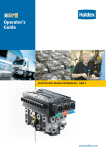
![Trailer Roll Stability (TRS) Installation Manual [L30040]](http://vs1.manualzilla.com/store/data/006020641_1-040a22153212ab13bbec744ca183c148-150x150.png)


